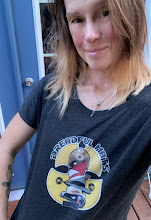I've decided to post most of the rest of this journal entry because it is cute--ah, to be 20-something and living in Brussels. This was the first entry, a typed entry, in what was to be her journal. But I have no more entries in my hands until May 1970. My mother praises the weekend (ah, life pre-children) and goes from deciding to be a poet to dreaming of running a radio talk show:

"Anyway, I started off this morning very happy because it was Saturday. A marvellous day, the most marvellous day, of the week. Strangely enough, the sun always seems to be out, even in Brussels, at least in the morning and the middle of the day. To spend the first few hours mildly tidying up and sweeping the apartment is almost bearable, since it gives me time to work out all the things I shall do, today and in the future. Everything seems possible. Today I decided I would be a poet, writing lively and funny epic verse that would soon be in demand the world over. The BBC chattering in the background helps me along. Some silly word game at one o’clock called something like “Just One Minute” is extremely pleasant. The four participants, all articulate, vaguely humorous, have to speak for a minute on some topic like “smoking”, “cockroaches“, or “the first day at school”, etc., etc. They can’t hesitate or repeat their nouns. A silly game, but the voices are soothing and just listening to the words pattering out pleases me. All those BBC word games please me immensely, like My Word, My Music, and Verbal Tennis. As I potter around I decide that I really would be absolutely happy if I spent the rest of my life, or at least six months, devising such games. Then came the Midlands “Trolley Service”, or something like that, a sentimental hospital request session. The English are as addicted to the same old sentimental tunes as we Australians, and I feel as if I am hearing an exact replay of the ABC’s listeners’ choice. The Nuns’ Chorus, Bless this House, There’s No Place like Home all pour out with predictable regularity, and I like it. Bless this house today made me get a lump in my throat because it used to thrill my grandmother back in Sydney. The chap running the show today said that it was from Aunty Flo or someone for Ethel and that he hoped Ethel would be up and about again soon. Then came the Saturday play, about hippies, which I didn’t listen to. But the words and the voice were pleasant, and all I remember is that one chap, presumably the hippie hero, had a soliloquy that must have lasted ten minutes. It has to be a good play to have just one person talking that long. [I think she means to suggest this was not a good play.] Then the collection of Women’s Hour interviews and talks run by Josephine someone always interests me, trivial as it is. I see myself as becoming so well known as to be in demand for little talks on such sessions—or else I see myself running and organizing such a programme and having a tremendous time.
Sunday is the day for papers and sheer laziness. I feel terribly put out when the English fog prevents the delivery of the Observer and the Sunday Times, which happens once or twice a month. The papers are yet another source of inspiration. In fact, now that I look at it, I see Saturdays and Sundays are my recharge days, and often the inspiration has enough impetus to see my through the week. At least today I have found enough energy to sit down at this machine and start a long intended journal—as Paul Gallico says in his “Secrets of a Storyteller’s Mind”[Confessions of a Storyteller?], there’s nothing like applying the seat of the pants to the seat of the typing chair to get a writer on his way. Not that I’m a fan of Gallico.
The short stories I have more or less in my head are:
1. John the Hippie. In Kochel, telling the callows about pot, etc., and eventually getting a new market for his dope.
2. Rosie the barmaid, trying to pay off her debts, breaking her knees, etc., and eventually winning through. If that doesn’t fit the short story formula that Scott Meredith is so keen on, I don’t know what will.
3. Then there’s the new jigsaw idea, that could easily be turned into a Scott Meredith special, too.
4. There there’s the second Madeline and Bettina story. But I can’t stand those two for a while, not after Scott Meredith’s attack on the first one. Still, I do think they are saleable, SM or no SM.
Not to mention magnificent novels:
1. The Story of My Life.
2. The one about three married women, conflict and murder in France.
3. And my sweet little children’s adventure story about the kidnapping. [I think she used this story as a story within a story in The Tempest of Clemenza, written almost 30 years after this journal entry.]
Not to mention all those fantastic articles for the big glossies:
1. Language courses abroad.
Can’t think of any others at the moment.
Of all these wild dreams, the only thing I shall probably actually do are my trivial little talks for Radio Australia."



